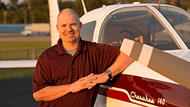Don Trent – Acute Lymphocytic Leukemia (ALL)

In the fall of 2004, I learned the true meaning of “life takes a detour.” Until that point, I was living a hectic, but happy life — working in a career that I loved, taking graduate courses, and spending time with my wife and two daughters, four and 10 months old at the time. I maintained a healthy, active lifestyle, running and walking every day for exercise.
I noticed a small lump on my scalp in October, and the number of lumps increased as weeks passed. After the lumps became bothersome, I went to a surgeon to have them removed, who in turn sent my tissue to the lab for testing. After subsequent testing, to my surprise, I was diagnosed with acute lymphocytic leukemia (ALL).
I spent most of 2005 receiving several phases of oral and intravenous chemotherapy treatment at Hillman Cancer Center under the care of Dr. Dennis J. Meisner. After physically and mentally demanding treatments, I was able to return to work in late November 2005, almost a year to the date after my diagnosis. I began to regain my stamina and strength as my treatments became fewer.
Unfortunately, in November 2007, I suffered a relapse. My next option for treatment was to undergo a stem cell transplant. I prepared for the transplant under the care of Dr. Mounzer Agha. Dr. Agha discussed the risks and benefits of the transplant process and procedures. He straight-forwardly explained what I was facing, and I decided to go for it.
We started to search for a donor and my brother and sister underwent an HLA test. Fortunately, we didn't have to wait long for a donor; my brother, Larry, was a compatible match.
In February 2008, I was admitted into UPMC Shadyside where I received high doses of chemotherapy in preparation for my allogeneic stem cell transplant. On February 19, I received his transplant from Larry.
Dr. Agha and his team were especially encouraging, reminding me to take one step at a time, but keep my eyes on the future. My daughters practically grew up visiting the hospitals. Some find sadness in that, but not my girls. They don't remember long hours of treatments, testing, and procedures, but rather all the wonderful and kind people that took time to engage with them and encourage them. It has been over five years since my transplant and I am doing well.
In early 2009, I was able to return to work. It has been more than five years since my transplant, and I'm doing well. I am back to exercising regularly, and in just a few years after my transplant, me and my two daughters took up skiing, a new hobby.

